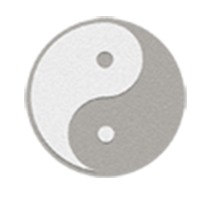Exceptional modesty and conscientiousness are sure to be rewarded with success; however, if a man is not to throw himself away, it is important that they should not become empty form and subservience but be combined always with a correct dignity in personal behavior. We must understand the demands of the time in order to find the necessary offset for its deficiencies and damages. In any event we must not count on great success, since the requisite strength is lacking. In this lies the importance of the message that one should not strive after lofty things but hold to lowly things.
The structure of the hexagram gives rise to the idea that this message is brought by a bird. In Ta Kuo, PREPONDERANCE OF THE GREAT (28), the four strong, heavy lines within, supported only by two weak lines without, give the image of a sagging ridgepole. Here the supporting weak lines are both outside and preponderant; this gives the image of a soaring bird. But a bird should not try to surpass itself and fly into the sun; it should descend to the earth, where its nest is. In this way it gives the message conveyed by the hexagram.
She passes by her ancestor
And meets her ancestress.
He does not reach his prince
And meets the official.
No blame.
Duration is a state whose movement is not worn down by hindrances. It is not a state of rest, for mere standstill is regression. Duration is rather the self- contained and therefore self-renewing movement of an organised, firmly integrated whole, taking place in accordance with immutable laws and beginning anew at every ending. The end is reached by an inward movement, by inhalation, systole, contraction, and this movement turns into a new beginning, in which the movement is directed outward, in exhalation, diastole, expansion.
Heavenly bodies exemplify duration. They move in their fixed orbits, and because of this their light-giving power endures. The seasons of the year follow a fixed law of change and transformation, hence can produce effects that endure.
So likewise the dedicated man embodies an enduring meaning in his way of life, and thereby the world is formed. In that which gives things their duration, we can come to understand the nature of all beings in heaven and on earth.




 “A man has to understand his existence in relationship to the universe. Whosoever knows this knows the truth. The whole world around you will be beautiful if you understand that you are you.” Yogi Bhajan
“A man has to understand his existence in relationship to the universe. Whosoever knows this knows the truth. The whole world around you will be beautiful if you understand that you are you.” Yogi Bhajan
